In this roundup of the Court Judgements, we look at the Supreme Court’s observations & directions about permission to investigate a case filed under Section 23 of the POCSO Act, that Ex-post facto environmental clearance may be granted in exceptional cases, that Courts should not take shortcut approach and address only one issue when multiple issues are raised. We also look at the Karnataka High court’s comments about ‘Marital Rape’.
SC: Bench gives split verdict when considering the need for court permission to investigate a case under Section 23 of POCSO for disclosing child victim’s identity
In Gangadhar Narayan Nayak @ Gangadhar Hiregutti vs. the State of Karnataka, the appellant is an editor of a newspaper. In 2017, a news report was published in the newspaper regarding the sexual harassment of a 16-year-old girl revealing her identity. The victim’s mother lodged a complaint against him under section 23 of the POCSO Act for mentioning her daughter’s name in the report. Section 23 of the POSCO Act makes the disclosure of a child’s identity a punishable offence. The police filed a chargesheet at the Court of the Principal District Judge, Uttar Kannada, Karwar. In 2018, the Court directed that summons be issued to the appellant.
The appellant who is the accused argued that the police registered the FIR without following Section 155(2) of CrPC which calls for a magistrate’s order for police to investigate non-cognizable offence. When the Trial Court dismissed his appeal, the appellant approached the Karnataka High Court under Section 482 of the CrPC, seeking a quashing of the proceedings against him. However, the High Court rejected the petition, following which he appealed to the Apex Court.
The question before the Supreme Court was if Section 155(2) of CrPC is applicable to the investigation of an offence under Section 23 of the POCSO Act. The Supreme Court bench comprising Justice Indira Banerjee and Justice JK Maheshwari delivered a split verdict.
Justice Banerjee stated that Section 23 of POCSO clearly prevents the disclosure of the identity of the victim and doing so is a fundamental breach of the right of the child to dignity. The proceedings emanating from Section 23 cannot be vitiated on the ground that prior permission of the Magistrate should be taken by Police to start an investigation, stated Justice Banerjee. She further added that the Police unit should make immediate arrangements for the care and protection of the victim child if it is satisfied that the child needs care and protection.
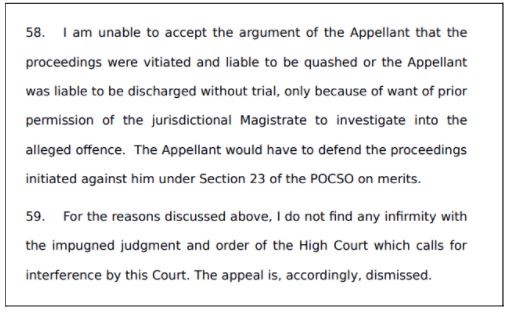
Justice Maheshwari held that in the absence of any procedure for investigation under the POCSO Act, be it cognizable or non-cognizable offences, the procedure prescribed in CrPC should be followed for investigation, enquiry, and trial. He stated that the officer-in-charge of a police station is competent to make an arrest without a magistrate’s order when a cognizable offence is committed. However, in the case of a non-cognizable offence, the police officer is not supposed to investigate without the order of the court.
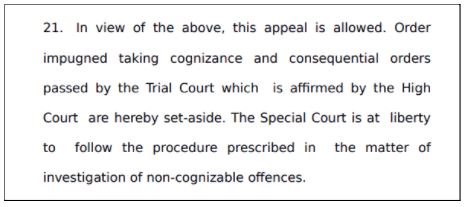
Since one member of the Bench dismissed the appeal while the other member allowed it, the matter will be referred to another Bench.
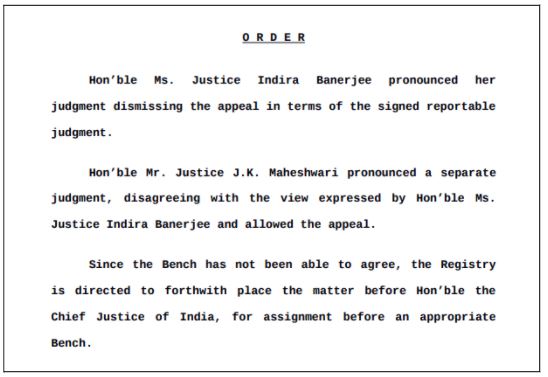
SC: Ex-post facto environmental clearance may be granted in exceptional cases
In Pahwa Plastics Pvt. Ltd vs. Dastak NGO, the Supreme Court heard an appeal filed by Pahwa Plastics Pvt. Ltd against an NGT order stating that the firm’s manufacturing units had to stop operating as it had not obtained prior environmental clearance. The question before the Bench of Justices Indira Banerjee and JK Maheshwari was “whether an establishment employing about 8000 workers, which has been set up pursuant to Consent to Establish (CTE) and Consent to Operate (CTO) from the concerned statutory authority and has applied for ex post facto EC can be closed because of pending issuance of EC, even though it may not cause pollution and/or maybe found to comply with the required pollution norms?”
The Bench allowed the appeal observing that the Environment (Protection) Act, 1986, did not prohibit the grant of ex post facto environmental clearance. Since ex post facto environmental clearance can be granted in accordance with the law, the Court said that it cannot be oblivious to the economy or the livelihood of hundreds of employees. A “technical irregularity” of not obtaining prior environmental clearance must not be used as a reason to close such an establishment that is contributing to the economy. While it is necessary to comply with the environmental clearance, ex post facto environmental clearance should not be granted regularly, but only in exceptional cases. The court stated that the “deviant industry” may be penalized as per the ‘polluter pays’ principle, and the cost of restoration of the environment may be recovered from it.
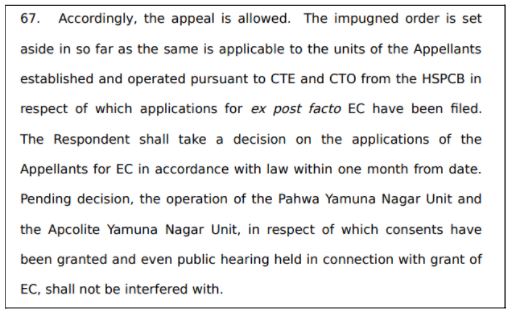
SC: Courts should not take a shortcut approach and address only one issue when multiple issues are raised
In the case of Agricultural Produce Marketing Committee Bangalore vs. State of Karnataka, the appellant, APMC Bangalore, filed a batch of appeals with the Supreme Court challenging the decisions of single and division benches of the Karnataka High Court with respect to land acquisition.
The following issues were raised in a writ petition before a Single Judge and later appealed to the Division Bench of the High Court. However, the High Court held that those respective acquisitions have lapsed under Section 24(2) of the Act, 2013. Only issue (e) was addressed by the High Court while allowing the appeal.
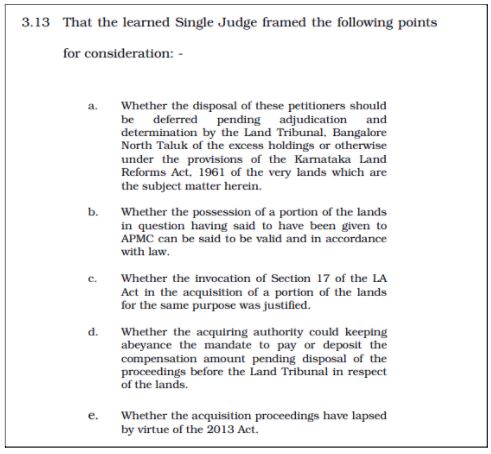
When the Supreme Court was considering the appeal, it noted that the High Court had not considered all the issues placed before it. The Bench comprising Justices MR Shah and BV Nagarathna observed that the High Court should have considered the other issues and should have given its findings on other issues as well. It held that it had no other alternative but to remand the matters to the Single Judge for deciding the Writ Petitions afresh, taking into consideration the other issues raised as well.
The Bench quashed the judgment passed by the Division Bench and stated that it is the duty of Courts to give its judgement and findings on all issues raised and not just one. It added that the Courts should not adopt a shortcut approach by giving a verdict on only one of the issues, which would increase the burden on the appellate court.
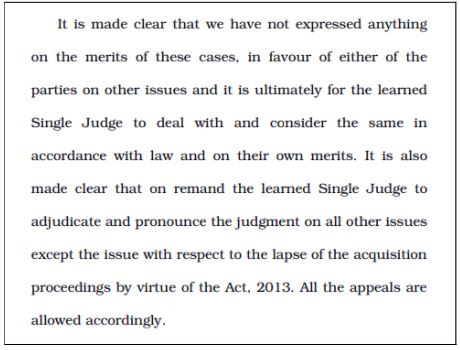
Karnataka HC: Exemption of husband from rape under Section 375 is a violation of Article 14
In Hrishikesh Sahoo vs. State of Karnataka, the petitioner’s wife had filed a complaint against him in 2017 alleging rape, marital violence, and sexual assault on their daughter under Sections 506, 498A, 323, 377 of the Indian Penal Code and Section 10 of POSCO Act. The police also filed a chargesheet against him following an investigation. The petitioner challenged the chargesheet in the High Court on grounds that rape charges are not applicable against the husband of a rape victim as per Section 375 of IPC which states that sexual acts by a man with his own wife provided she is above fifteen years of age, is not rape.
A single-judge bench of Justice M Nagaprasanna upheld the charges against the petitioner observing that a man is a man; rape is a rape, be it performed by a man the “husband” on the woman the “wife”. He added that the institution of marriage cannot be used to confer any special male privilege or a license for unleashing of a “brutal beast” on the wife. He stated that exempting a husband going by Section 375 of the IPC would be inequality and violate Article 14 of the Constitution. He traced the origin of Section 375 to Macaulay’s Code which was the basis for IPC. The code was made by the British in the Victorian Era when husbands wielded their power over their wives, and women were deprived of their basic rights. The Court noted that marital rape is illegal in the UK, 50 American states, three Australian states, New Zealand, Canada, Israel, France, Sweden, Denmark, Norway, Russia, and Poland.
The court iterated that the present order was regarding the framing of charges against the husband and not about whether marital rape should be considered an offence, and that it was up to the legislature to delve into the issue and consider removal of the exemption.
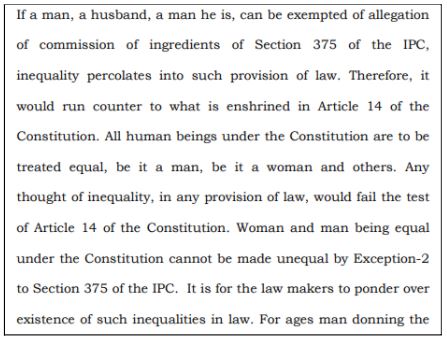
SC: Ayurvedic doctors are entitled to be treated at par with Allopathic Medical Officers and Dental Medical Officers under NRHM
A bench comprising Justices Vineet Saran and J.K. Maheshwari upheld the order of the Uttarakhand High Court regarding the salary of Ayurvedic Doctors under the National Rural Health Mission. While dismissing the challenges against the High Court’s order in State of Uttarakhand & Others. vs. Sanjay Singh Chauhan & Others, the Supreme Court held that Ayurvedic doctors are entitled to be treated at par with Allopathic Medical Officers and Dental Medical Officers under the National Rural Health Mission (NRHM/NHM) Scheme.



